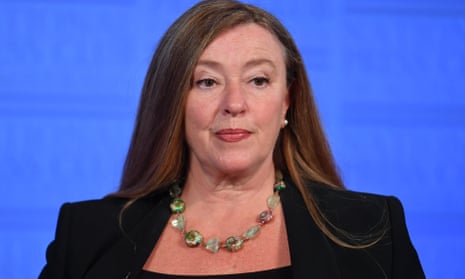Australians must be vigilant to ensure that extraordinary powers invoked during the Covid-19 pandemic are not extended beyond the crisis, the president of the Law Council has warned.
Pauline Wright told the National Press Club on Wednesday that human rights were particularly vulnerable to serious breaches in times of crisis.
The head of the Law Council of Australia said the constitution protected very few rights, and Australians would be surprised to learn “that the rights which have been so hotly debated during the pandemic are in fact backed by few constitutional or statutory guarantees”.
“We do need to remain vigilant – to ensure that measures taken in crisis do not endure beyond the tail of the crisis,” Wright said. “We do need the tools to guard against overreach.”
She called for Australia to adopt a federal human right act, arguing that it was the only western democracy without some form of a charter of rights at the national level, whether legislated by parliament or entrenched in the constitution.
“While on one hand we can be proud of the collective efforts of Australians to combat the Covid-19 pandemic, we must be careful to avoid an erosion of the rights and freedoms that my father and his parents’ generation fought for and that many Australians have had the luxury of taking for granted,” she said.
Wright cited concerning developments such as the criminal prosecution of Witness K and Bernard Collaery, raids on journalists and media organisations, encroachments on Australians’ right to privacy, and and tech companies “facing an environment of enforced surveillance with legislation enacted requiring IT companies to hand over user information, even if it is encrypted”.
She said the pandemic illustrated a need for a greater understanding that “multiple rights may be at play in any given situation, and that tensions can and do arise between conflicting rights, which must be resolved”.
“Specific rights are sometimes asserted by members of one part of the community to the detriment of the rights of others,” she said.
“For instance, some may say that the requirement for quarantining following travel infringes their freedom of movement or freedom from arbitrary detention.
“However, there may not always be a full appreciation that the broader community has, under international instruments, rights to health and life, which governments and lawmakers are obliged to respect, protect and enable.”
Wright said a federal human rights charter could aid public acceptance of government decision-making processes – including for decisions which must be made amid rapidly unfolding circumstances.
She argued that the experience of jurisdictions with human rights charters in place – Victoria, the Australian Capital Territory and Queensland – reflected “tangible and practical improvements in the way that people’s rights are upheld in practice”.
“These range from successfully challenging the use of restraints on a sick older woman in distress, to moving a 40-year-old man with disability from aged care into more appropriate care, to delaying evictions of older people until alternative accommodation can be found, to stopping the transfer of children into adult prisons,” she said.
